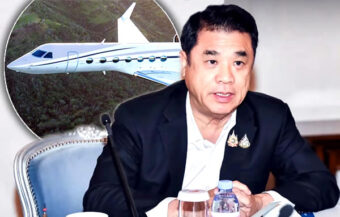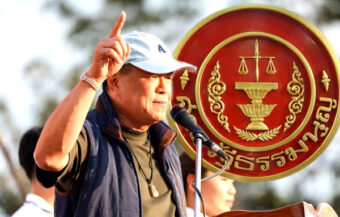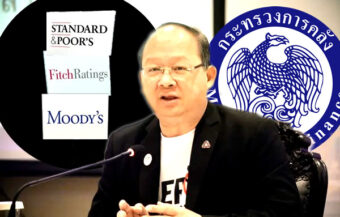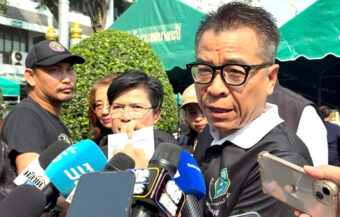Game-changer deal approved! Thai cabinet backs historic US trade pact slashing tariffs to 19% — industry leaders and bankers demand rapid rollout to boost exports, spark reforms and modernise economy amid warnings over China reliance and rising risks.
Thailand’s business community is firmly behind the August 1st tariff deal with the United States. Despite tough challenges in the agreement, the government must act fast and fully implement the framework hammered out with US negotiators. This deal targets Thailand’s biggest and most lucrative market—and serves as a crucial blueprint for urgent structural reforms in an economy sliding for decades.

Thailand is cautiously optimistic following a breakthrough in trade relations with the United States. On Friday, the Thai cabinet approved a revised bilateral trade agreement. This new accord marks a turning point in Thailand’s external economic strategy. Moreover, it reflects the government’s attempt to reposition the country in global trade.
The deal significantly slashes tariffs on key Thai exports to the U.S., reducing them from 36% to 19%. As a result, it is widely seen as a major boost to Thailand’s global trade competitiveness. More importantly, it is regarded as a critical win for exporters across diverse sectors.
Consequently, the Kasikorn Research Centre has raised its 2025 GDP growth forecast. The projection now moves from 1.4% to 1.5%, citing stronger export potential. Meanwhile, the Ministry of Finance remains even more optimistic and is holding steady to its original projection of 2.1% growth. Together, these revised forecasts indicate rising confidence in Thailand’s economic rebound.
Thailand’s economic rebound to be driven by exports as trade pact with US is a crucial and strategic boost
Crucially, the rebound is expected to be largely driven by export expansion. Clearly, the Thai government sees the trade pact as an essential engine for national recovery. In this context, the agreement is not just timely—it is also strategic.
Moreover, the United States continues to be Thailand’s most profitable and vital export market. Accordingly, the reduction in tariffs is expected to stimulate demand for Thai goods. It could also open new trade channels and strengthen long-term commercial ties. Additionally, the deal might attract greater foreign direct investment into Thailand.
Notably, the agreement supports broader structural reforms. These reforms are aimed at building economic resilience and reducing dependence on any single market. Therefore, the strategic benefits extend far beyond mere export volumes.
Importantly, the agreement goes beyond just tariff cuts. It also targets non-tariff barriers that have historically frustrated Thai exporters. Under the revised terms, American imports to Thailand will face fewer administrative hurdles and benefit from faster customs clearance. These changes could sharply improve trade logistics.
Trade pact could boost trade volumes and reduce costs through energy imports and modernisation
If the Thai government follows through on its commitment to streamline bureaucracy, bilateral trade volumes may surge. This would especially benefit sectors that have suffered from red tape and outdated regulations.
Additionally, the U.S. has pledged to increase energy exports to Thailand. This could reduce electricity costs for Thai businesses and consumers, while also enhancing national energy security. For Thai livestock producers, cheaper American corn is a major gain. Consequently, lower feed costs will improve profit margins and reduce volatility.
Furthermore, high-tech U.S. goods—such as medical devices and auto parts—will now enter the Thai market in greater volumes. Many of these products are not manufactured locally. Therefore, their arrival will fill existing gaps and stimulate industrial modernisation.
However, the agreement is not yet law and must still pass parliamentary scrutiny before full implementation. Even so, the announcement already provides a firm foundation for deeper U.S.-Thai trade relations. Despite lingering concerns, the framework clearly signals a pivot in Thailand’s global trade posture.
Domestic sectors voice concerns, but most business leaders welcome the deal as a gateway to reform
Nevertheless, domestic concerns are emerging. Certain industry groups have voiced strong apprehensions. For instance, Thai pig farmers worry about a flood of cheap American pork. Therefore, they are urging the government to negotiate safeguards that would protect the domestic agricultural sector from unfair competition.
Similarly, Chinese companies operating within Thailand’s duty-free zones feel threatened. They fear that American goods will erode their competitive edge. As a result, they may push for regulatory adjustments to preserve current advantages.
Yet, despite these worries, most business leaders have welcomed the deal. They see the agreement as offering far more than expanded market access. For many, it is a gateway to deeper economic reform and modernisation. By aligning more closely with the U.S., Thailand could reduce its long-standing overreliance on Chinese markets.
According to Jirayu Huangsap, spokesman for the Prime Minister’s Office, private-sector leaders quickly praised the deal. They commended the government’s diplomatic team, often referred to as “Team Thailand,” for their coordinated and strategic efforts. More importantly, they celebrated the achievement of a regionally competitive tariff rate.
Industry leaders highlight the benefits of a lower tariff rate for exporters and investor confidence
Kriangkrai Thienukul, president of the Federation of Thai Industries, voiced strong support for the new 19% rate. He emphasised that the lower tariff helps Thai exporters remain globally competitive. It also boosts industry morale and improves investor sentiment.
Echoing that view, Wisit Limluecha, vice chairman of the Thai Chamber of Commerce, said that pricing parity with regional rivals will enhance Thailand’s appeal. In turn, this will attract international buyers who previously overlooked Thai products due to cost disparities.
Suphachai Chearavanont, chairman of CP Group, went a step further. He called the trade deal both a diplomatic and economic success. In his view, it reaffirms Thailand’s status as a credible and reliable U.S. trade partner.
Furthermore, Jirayu confirmed that additional negotiations with U.S. trade officials are already planned. These talks aim to secure even more favourable terms and further Thailand’s long-term economic interests. He stressed that public-private sector collaboration will be key to ensuring sustainable progress.
Financial sector supports tariff cuts as key to export growth and business confidence amid emerging risks
Support also came from the financial sector. On August 1, Payong Srivanich, president of the Thai Bankers’ Association, said the tariff cuts greatly improve Thailand’s export competitiveness. He added that the agreement reduces economic uncertainty and bolsters business confidence.
Kasikorn Research highlighted another important aspect. The 19% rate is now lower than India’s current tariff level. This gives Thailand a strategic edge in Asia. It also aligns the country with ASEAN peers, reinforcing its position in regional trade.
Thanks to the improved outlook, Kasikorn has upgraded its export growth forecast. They now expect Thai exports to grow by 3.4% in 2025. This is more than double their earlier estimate of 1.5%. Lower tariffs and improved logistics are key drivers behind this revision.
Despite the positive momentum, risks still loom. The U.S. is planning to introduce transshipment tariffs of up to 40%. These tariffs target low-value-added re-exports that often move through Thai supply chains. Therefore, Thailand could face indirect exposure.
Analysts call for clearer rules to protect Thai producers from potential impact of U.S. tariffs and imports
To mitigate this, analysts are calling for clearer domestic content rules. Such measures would shield Thai producers and ensure compliance with U.S. trade conditions.
Although around 90% of U.S. imports will receive Thai tariff waivers, few new American products are expected to enter the Thai market. Many already enjoy low or zero Most Favoured Nation tariffs. In addition, several high-tech items included in the agreement are not yet produced in Thailand.
Nevertheless, increased U.S. imports of soybeans, corn and processed meats could hurt Thai farmers. Food manufacturers, however, might also see lower input costs, helping competitiveness. So far, the government has not detailed any specific support packages. They will be carefully calibrated.
However, for now, the focus is on exploiting the competitive deal announced on Friday.
Thailand pursues new trade deals to diversify risks as tourism recovery lags behind expectations
To reduce exposure, Thailand is pursuing new trade agreements with the European Union and Canada. These negotiations aim to open additional export markets. They also help diversify economic risks tied to U.S. policy changes.
Meanwhile, the tourism sector remains sluggish. Chinese tourist arrivals have not returned to pre-pandemic levels. Kasikorn now projects only 32.2 million foreign visitors in 2025. This falls short of earlier expectations. Consequently, recovery in tourism is likely to be slow and uneven.
Business leaders have applauded Deputy Prime Minister Pichai Chunhavajira and his team for securing the deal. They credit him with safeguarding key export sectors and preserving local jobs. Many also believe the agreement will speed up Thailand’s industrial transformation.
The Thai Bankers’ Association is collaborating with the Bank of Thailand and the Fiscal Policy Office. Their strategy focuses on supporting small and medium-sized enterprises. They aim to provide easier financing and improve workforce skills through targeted training programs.
National commerce committee backs reforms emphasising cost efficiency, technology and labour skills
The Joint Standing Committee on Commerce, Industry, and Banking also backs the agreement. Their national strategy emphasises cost efficiency, technology adoption and labour upskilling. These priorities are seen as essential for competing globally.
Despite widespread support, experts warn against complacency. TMBThanachart CEO Piti Tantakasem noted that global trade is becoming increasingly conditional. He believes the U.S. strategy is part of a broader plan to isolate China from key supply chains.
According to Piti, the trade deal should act as a wake-up call for Thailand. He urged the Board of Investment to focus more on capability-building. Rather than merely attracting foreign capital, he advocates developing unique Thai products and building resilient domestic supply chains.
He also warned that grey-market firms may distort competition unless regulations are enforced. Meanwhile, Thai Chamber of Commerce Chair Poj Aramwattananont called for swift government action. He highlighted the need for faster tech upgrades, better access to funding and smarter export strategies.
Clearer rules on transshipment and production costs urged to avoid trade conflicts and boost competitiveness
Poj also flagged the risk of penalties for transshipment violations. He urged the government to issue clearer rules on regional value content. These measures could help Thailand avoid future trade conflicts.
Finally, Kriengkrai Thienukul of the Federation of Thai Industries advised businesses to lower production costs. He cautioned against transferring higher expenses to consumers. Instead, he encouraged firms to seek new markets and embrace advanced manufacturing technologies.
Thaksin wants higher excise duties on EV cars that are simply assembled in Thailand by Chinese firms
Game changer US Thai trade deal approved at special cabinet meeting as 19% tariff rate warmly welcomed
Tanit Sorat from the Employers’ Confederation echoed these points. He said Thai farmers urgently need support to remain competitive. Supree Thongpetch of the Thai SME Council added that over 2 million small businesses could feel the impact of this deal.
Undoubtedly, the revised U.S.-Thailand trade agreement marks a pivotal shift in economic strategy. It offers a mix of new opportunities and emerging challenges. Therefore, Thailand’s success will depend on swift reforms, strong governance and forward-thinking leadership. Ultimately, the next steps will determine whether this historic deal becomes a breakthrough or a missed opportunity.
Join the Thai News forum, follow Thai Examiner on Facebook here
Receive all our stories as they come out on Telegram here
Follow Thai Examiner here
Further reading:
Last minute tweaks in Bangkok as deal is finalised with U.S. However, Thailand may not match Vietnam


















